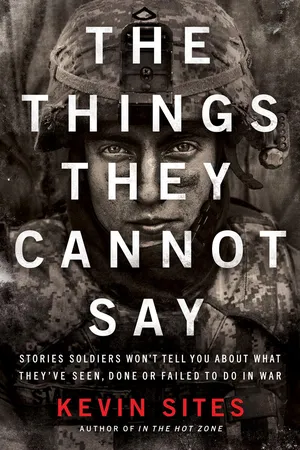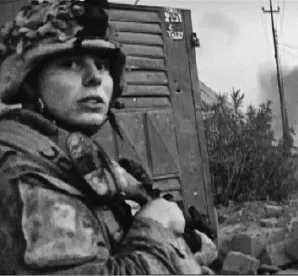Part I: The Killing Business
What’s It Like to Kill in War?
Phantom Noise
There is this ringing hum this
bullet-borne language ringing
shell-fall and static this late-night
ringing of threadwork and carpet ringing
hiss and steam this wing-beat
of rotors and tanks broken
bodies ringing in steel humming these
voices of dust these years ringing
rifles in Babylon rifles in Sumer
ringing these children their gravestones
and candy their limbs gone missing their
static-borne television their ringing
this eardrum this rifled symphonic this
ringing of midnight in gunpowder and oil this
brake pad gone useless this muzzle-flash singing this
threading of bullets in muscle and bone this ringing
hum this ringing hum this
ringing
—Brian Turner, U.S. soldier (Iraq and Bosnia), writer-poet, educator
Corporal William Wold, U.S.M.C.
3rd Battalion, 1st Marines
The War in Iraq (2004)
Chapter 1: Killing Up Close
I’ll never tell her what things I did here. I’ll never tell anybody.
Imagine you are a Marine ordered to clear a building during one of the bloodiest battles of a particularly brutal and dirty war. Anything could be waiting for you inside: mines, booby traps, goats, women, children . . . or fully armed enemy fighters. Once you discover what’s on the other side of the wall, you will have to make a decision in a fraction of a second about whether you need to pull the trigger or not. The marvels of modern weaponry—robot drones, guided cruise missiles and even small arms that have great accuracy over long distances—have made this kind of close-quarters combat mightily rare and mostly unnecessary. But this day, for Corporal Willy Wold, is one of the exceptions. When I see him, he’s standing in front of a wall outside a mosque in Fallujah and firmly in the almost manic-rapturous throes of a full-tilt adrenaline dump, the kind you get when you come face-to-face with your enemies and kill half a dozen of them before they can kill you.
Only about forty minutes ago, his fireteam had entered the mosque in south Fallujah from which insurgents had been shooting. At one point during this war American military leadership had decided not to attack mosques, even if insurgents were fighting from inside. The public-relations blowback of destroying a Muslim holy place undoubtedly created more insurgents instead of fewer. But this unofficial policy also gave rise to what American military strategist and historian Edward Luttwak calls the “paradoxical strategy of war,” which, in very simplified terms, proffers that regardless of the soundness of your strategic thinking on the battlefield, your enemy will quickly adapt and use your practices against you. Because the Americans weren’t attacking mosques, insurgents routinely fought from them, even using their towering minarets as sniper nests. Frustrated, American generals decided before Operation Phantom Fury, a major offensive to drive insurgents from Fallujah, that the restraints were coming off and if insurgents holed up in a mosques, those mosques were coming down.
This mosque that Willy Wold entered would be an example of that new policy. When Marines took fire from it, they responded by blasting holes through the walls with high-explosive rounds fired through the 120 mm main guns of their M1A1 Abrams tanks. Soon after, a squad of Marines led by Lance Corporal Patrick O’Brien entered the mosque. They found one dead and five wounded insurgents (the same mentioned in the prologue), likely the result of the tank’s rounds.
The wounded Iraqis inside the main hall surrendered without a fight, slumped against the back wall bleeding and broken. But there was another room that hadn’t been checked out yet. O’Brien ordered Wold and his three-man fireteam to stack on it (SWAT-style) and make sure it was clear.
Wold did as he was told and on his signal, his men loaded into the room, one sweeping to the right with his rifle muzzle, the other to the left and Wold up the middle, like the linebacker he was in high school. They found nothing initially, but there was another doorway.
The first Marine entered and his pupils nearly popped trying to take in what was before him inside: nine armed insurgents, all bearded and ranging in age from midtwenties to midthirties. Some wore shirts and trousers, the others traditional dishdashas, which the American troops derisively referred to as “man dresses.” They were armed with AKs and RPG launchers, but at that moment of recognition, no one fired. There was the momentary “holy shit” pause, followed by the pulse wave of fear that violence is imminent. Wold yelled, “Shoot him,” to the first Marine, who blasted the man in front of him. Pushing in, Wold fired into the group as well while his other Marine covered him on the left, putting rounds into the mass of men, who were close enough to hug. When the bodies had all dropped, Wold and his team had fired more than three dozen rounds total. The Marines took a breath, knowing they had dodged their own death by the smallest of margins. They pushed away the insurgents’ weapons and did their dead checks, nudging the bodies in the groin and other sensitive spots with their boots or rifle barrels. If anyone was still alive it would have been impossible not to flinch. The Marines picked up the fallen weapons and stacked them outside at the front entrance of the mosque.
Later, I watched as the squad reluctantly carried the bodies to the main hall of the mosque, where the wounded insurgents lay. On the bodies of the dead, I could see the precision of the Marines’ shots, controlled bursts to heads and center mass, just as they were trained to do. A piece of brain matter fell from the head of one of the insurgents and a Marine used a piece of wood to scoot it across the floor, back toward its owner. There were some small fist-bumps and bro-hugs amongst the Marines in the aftermath, but the lumps of lifeless bodies sucked up any sense of jubilation in this victory. It’s one thing to kill your enemies in battle; it’s quite another to have to hoist their bullet-ridden bodies, by wrists or ankles or waistbands, and drop them in a pile, dead eyes open, breathless mouths agape, the stench of their soiled clothes mixed with the sulfur smell of cordite still thick in the air. While others dragged the corpses toward unrolled black body bags, Wold shuffled around them, surveying the destruction, not sure what he was supposed to be feeling.
Wold shook his head ever so slightly while the brigade commander, Lieutenant Colonel William Buhl, snapped his profile with a silver point-and-shoot camera, the victor in the aftermath. As the Marines continued their unpleasant work, fitting the dead two to a body bag, the wounded insurgents tried to avert their gaze, fearful they might yet share the same fate as their comrades. They wouldn’t on that day. Instead they were bandaged by Navy corpsmen accompanying the Marines and given water. The wounded included an old man in his late fifties or early sixties with a red kaffiyeh wrapped around his head; a stocky man, maybe thirty-five, in a gray dishdasha; a young man with a mustache in his late twenties, wearing only a shirt and his underwear, his wounded leg exposed (Taleb Salem Nidal, discussed in the prologue); and finally, a man in his early thirties with multiple wounds to the neck, arms and torso, wearing the shreds of an Iraqi police uniform, dark slacks and a light blue shirt. Despite his wounds and dirty, tattered clothes, he had a strong and handsome face, a neatly trimmed mustache and a firm jaw. Of all of the wounded men, he seemed to me the most stoic, betraying neither his fear nor his suffering.
When I saw Wold on the street outside the mosque afterward, these were his first words to me as I watched him through my video camera viewfinder:
“It was a fucking small room, dude. It was fucking small!” He shook his head. “Thirty-five fucking rounds. I was fucking scared, dude. I fucking grabbed my nuts.” Then he did, with one hand, and let out a big “Ohhh!”
“Tell me what you saw,” I said to him. He shook his head again in disbelief.
“I was told to go in the room,” he said, “and my first Marine went in . . . he saw a guy with an AK, I told him to shoot the guy, then I shot the six guys on the left . . . and my other Marine shot two other guys.”
A flood of questions filled my mind. I wanted to understand where the men were standing, the expressions on their faces, what it felt like to pull the trigger at such a short distance. How did their bodies, faces change? Did they simply crumple where they stood or did they fly back as if yanked by an invisible rope like what happens in the movies? All these questions, but none found words. “Tell me what you saw,” I blurted out again. Here was where curiosity and morbidity intersected, became indistinguishable.
“All I saw was guns pointed at me”—he shook his head again—“so it was just instinct to blare ’em. I gotta go,” he said, moving toward the sound of shouting and confusion.
I followed Wold down the street, where he learned that a friend of his had just been wounded. The single attacker vaulted over a wall. Wold took a fireteam inside the courtyard in pursuit, his adrenaline rush now fueling his anger.
“Get in that motherfucker and kill his ass,” he shouted as his team kicked in a metal gate. I followed them in, videotaping everything. They fired bursts into both buildings inside the courtyard. Nothing. Wold tossed a grenade through the space between the buildings, yelling, “Frag out,” as they piled outside for cover behind the courtyard wall. When there was no detonation, he sent another one of his guys in with another grenade. This one blew, its explosion muffled by the cinder blocks of the buildings. They rushed back into the courtyard, cle...

